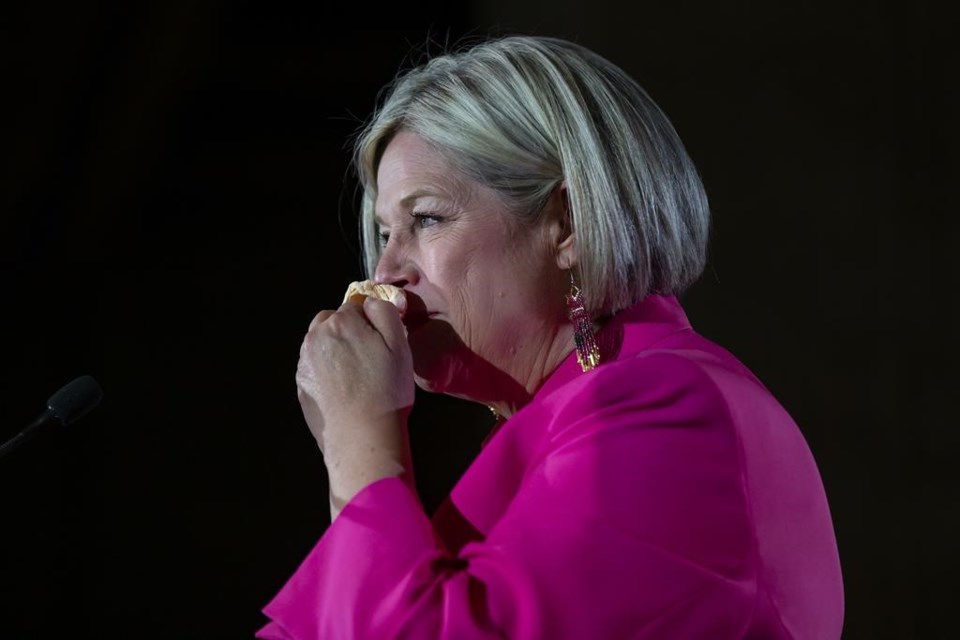For Andrea Horwath, the fourth time wasn't the charm.
The Hamiltonian who helmed Ontario's New Democratic Party for 13 years started off the campaign hoping to form government, and ended it by stepping down Thursday night, despite securing Official Opposition status for a second straight term.
"It's time for me to pass the torch, to pass the baton, to hand off the leadership of the NDP. It makes me sad, but it makes me happy because our team is so strong right now," she told supporters in an emotional speech.
Horwath, 59, served three terms as a Hamilton city councillor starting in 1997. She made the jump to the Ontario legislature in a byelection in 2004. She has been leader of the party since 2009, through four general elections.
Some observers had expected Horwath to step down if her party lost the third election, but in 2018, the NDP soared to official Opposition status while the Liberals were reduced to single-digit seats.
This time, the writing was on the wall, and Horwath came to the NDP's election party prepared.
After pulling out a tissue to wipe away tears, Horwath said she was doing her best to follow a family tradition.
"My grandma would have normally tucked it under her sleeve, but my sleeve is too loose. I had to tuck it into my belt," she said. "But I'm not shedding tears of sadness. I'm shedding tears of pride."
She's finishing off strong, if not exactly where she'd hoped to be.
The NDP had only 10 of the 107 seats in the legislature when Horwath was elected leader. As of Thursday, the party has 31 out of 124.
Horwath spent her last years at the head of the NDP criticizing the Progressive Conservative government's response to the COVID-19 pandemic.
She accused them of being too slow to act, not doing enough to keep students safe in school and too lax in protecting long-term care homes.
"We tried to get them for many years to invest in long-term care and to really turn around the horrific circumstances that people were living in, in long-term care homes, particularly the ones that were operated by private companies, but long-term care really did take the brunt," Horwath said while campaigning in Brampton, Ont., last week.
Ending for-profit long-term care homes was among her party's banner promises. They also included bringing mental health care under OHIP coverage, boosting minimum wage to $20 an hour in 2026 and repealing Bill 124, which capped public sector workers' wage increases.
The pledge made her popular among unions, though her ties to working class causes started much earlier.
She grew up in Stoney Creek, the daughter of an autoworker, and graduated from McMaster University with a degree in labour studies.
She went on to get a job at a workers’ education centre in Hamilton, established to help people with literacy and numeracy. As part of the job, Horwath had to get comfortable talking to all sorts of people.
"Here's me, I don't know maybe in my early 20s, maybe 23 or so, and I enter this union hall with all of these big, burly steelworkers to talk to them about ESL and literacy," she told The Canadian Press in an interview during the campaign. "It was pretty daunting."
Horwath said she still gets nervous sometimes when public speaking, but 10 years as a waitress helped her hone her communications skills.
Her extroverted side was on stark display after she was sidelined by COVID-19 just before the northern leg of her tour of the province.
She made her appearances virtually, her image displayed on a TV. Sometimes, she'd stop partway through a sentence to cough.
But when she was back, she was really back.
“I’m on fire, guys,” she shouted at the end of a morning announcement, her first day making in-person appearances again. "I think a couple of days in isolation have made me get re-energized."
This report by The Canadian Press was first published June 3, 2022.
Nicole Thompson, The Canadian Press

